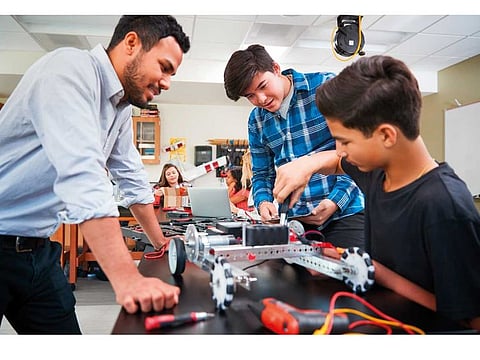What does a culture of excellence mean to UAE schools?
Schools are providing a well-rounded education that goes beyond academic grades

Students finishing school over the next decade will need to make their way in a world unrecognisable from the one their parents began their careers in. Fourth Industrial Revolution technologies – such as artificial intelligence to biotechnology and 3D printing – are already changing workplaces and producing new kinds of jobs, a state of affairs that is only expected to accelerate in the years ahead. A growing global population and the establishment of remote and hybrid working models could spur competition for jobs in new and different ways.
Schools play a significant role in preparing youth for this dynamic new future. By some measures, educational institutions are best placed to do so by creating a culture of excellence across their facilities so as to provide students with a toolkit that enables them to thrive in the vast majority of situations they may encounter. In other words, by shifting the focus from academic grades to personal development.
“The pursuit of excellence is crucial to creativity, knowledge generation, innovation, and the development of new products and services. In short, it is central to social and economic advancement. Given this, the practice of creating cultures of excellence should be given high priority in universities and other institutions,” researcher Michael Mintrom of the Australia and New Zealand School of Government at Monash University explains in a seminal paper outlining how students can be trained to self-consciously build behaviours that generate excellent outcomes.
While his paper refers to higher education, it offers pointers for institutions at every level. “Getting better at pursuing what works is not so much a matter of having more resources. It is about having a mindset oriented towards excellence [and] about having the courage to deploy the right resources to the right initiatives,” he writes.
Educational institutions, then, hold the power to deliver bright futures both for their students and society as a whole.
But how does that play out in the UAE? What approaches do local schools take to build such a culture of excellence. What educational approaches are they incorporating so every student can reach high levels of academic and social success?
Take a well-rounded approach
Building a culture of excellence comes down to a well-rounded education that goes beyond academic grades.
Fairgreen International School in Dubai codifies this culture into a seven-pronged programme. “The culture of excellence at Fairgreen International School is defined by our seven school pillars, focusing on academic growth and achievement, well-being, sustainability, character, innovation, social responsibility and international mindedness,” says Edward Pearce, Director, Fairgreen International School. “We place equal importance on each of the seven areas and keep them at the heart of all that we do to ensure the culture of the school is focused on the whole child.”
Encourage extracurricular activities
Integrated educational approaches must also focus on ancillary activities such as extracurricular activities in order to improve student maturity, build mental resilience and enhance their self-confidence.
“The purpose of extracurricular activities has changed,” says Antony Koshy, Principal, Global Indian International School, Dubai. “Nowadays, they are seen as developing a student’s persona and profile.”
The school caters to a wide range of interests, he says, including coding, space exploration, robotics, sustainability, gaming, yoga, fitness, social media curation, YouTube and more. “We can just say every single area of our lives is covered.”
Extracurricular activities carry an added advantage, he says: they strengthen university applications. “Building a well-rounded profile demonstrates that you are passionate and dedicated to the things you care about, both of which are qualities that would make you a welcome to the community of any university, and outstanding universities place significant weightage on extracurricular activities.”
Emphasise character-building values
Delivering a values-based education enhances academic achievement and helps develops students to develop social and relationship skills that can stand them in good stead throughout their lives.
The American School of Creative Science, Nad Al Sheba, aims to complement academic learning so students are armed with the social skills they need for future success anywhere in the world.
“Excellence rooted in values is our motto at ASCS,” says Principal Sara Holli. “We focus on nurturing our students’ good character, equipped with a moral framework, to develop self-awareness, and understand their roles as global citizens. Owing to this solid foundation, excellence flourishes mentally, physically, spiritually, as well as academically.”
Replicate real-life scenarios early
Dimpy Choudhary, Vice Principal at Sabari Indian School (SIS), says its curriculum sans boundaries in many ways prepares the students for life and not just the standard benchmark assessments.
“SIS offers a range of programmes such as financial literacy, AI with ICT, STREAM, Art and Design/Graphics, and so on, which provide opportunities to participate in a host of activities that enrich the learning experiences, develop talents, and learn new skills.
“I am especially proud of students’ startup ideas around social media influencing and chocolatier business through our Entrepreneurship lessons. It has allowed us to see our young minds getting ready to be entrepreneurs and make impressive pitches to raise funds and learn to make the right choices around managing finance-related decisions in the coming future.
She also spotlights the SIS Expothon, a student-led initiative that aims at connecting students and teachers across the globe, exchanging ideas, experiences, and arriving at solutions. “This event has been a brainchild of our current Grade 9 students who took it upon themselves last year to demonstrate how to turn any challenge into an opportunity.”
Sign up for the Daily Briefing
Get the latest news and updates straight to your inbox



